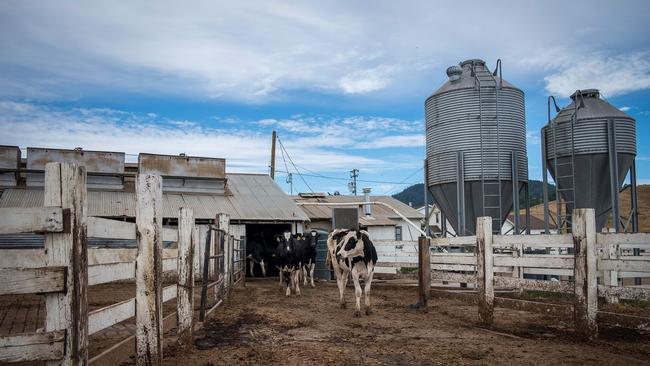China lands ‘body blow’ on struggling US farm belt
US farmers are bracing for more pain from the escalating trade battle between the world’s two biggest economies.

The US farm belt is bracing for deeper pain from the escalating trade battle between the world’s two biggest economies after China said it would suspend all imports of US agricultural goods.
China’s move will impact farmers raising fuzzy green soybean pods in Illinois, milking cows in California and feeding hogs in North Carolina, all of whom have seen business suffer as a result of tariffs that Chinese officials implemented last year.
China’s suspension of US farm purchases is a “body blow” to US farmers and ranchers, said Zippy Duvall, a Georgia farmer and head of the American Farm Bureau Federation. “We urge negotiators to redouble their efforts to arrive at an agreement, and quickly,” he said.
Feeding China’s growing appetite has meant big business for the US farm economy. China was one of the biggest export destinations for US agricultural commodities from 2009 to 2010 alongside Canada and Mexico, according to the US Department of Agriculture. In 2017, Chinese buyers imported $US19.5 billion in farm goods.
That dropped to $US9.1bn last year as China’s tariffs on US soybeans, pork, milk and other products made them more expensive for importers there, prompting some to seek alternatives and scale back imports from the US. Over the first six months of this year, China’s agricultural imports from the US were down 20 per cent from the same period last year.
“I don’t know how much more the farm economy can handle,” said Andy Huston, a sixth-generation corn and soybean farmer in Warren County, Ill. “The uncertainties are the worst.”
Some US-based grain exporters, meatpackers and ethanol producers are seeking new markets and stockpiling products. The trade fight is ratcheting up financial strain after years of low crop prices and persistent spring rains, which forced some farmers this year to delay planting or file insurance claims over lost crops.
The Trump administration has taken steps to help farmers hurt by the trade fight. The USDA last week began signing up farmers for a program that will disperse about $US14.5bn to US farmers, following roughly $US10bn program last year. Farmers say the government payments will help, but likely won’t make them whole.
Jim Mulhern, chief executive of the National Milk Producers Federation, said dairy exports to China have dropped 54 per cent so far this year. “Any step away from an agreement that further escalates tensions puts recovery of these sales further out of reach,” he said.
The trade battle is also hurting agribusinesses. Research firm Trade Partnership Worldwide in February projected that tariffs on US exports could cost the country’s agricultural sector 59,000 to 71,000 jobs over the next two years.
Cargill Inc. cited the dispute last month when the Minnesota-based company reported a 67 per cent drop in quarterly profits. Archer Daniels Midland, after reporting a 58.5 per cent decline in quarterly earnings last week, warned that China is becoming more comfortable buying food elsewhere, recently approving poultry imports from Russia and pork shipments from Argentina.
“People find alternatives, and eventually, they become a little bit more comfortable with those alternatives,” said Juan Luciano, ADM’s chief executive. “This is not good for the US farmer. This is not good for the percentage of US in the export markets.”
Near Los Banos, in California’s Central Valley, Bowles Farming is planning to decide by January whether to switch to more profitable crops after tariffs pushed down prices for cotton. That could involve laying off workers, said Chief Executive Cannon Michael.
“You don’t have the luxury of planting something that you know you are going to lose money on,” Mr Michael said.
China’s halt to US food imports is particularly painful for US hog farmers and pork processors. That industry has counted on supplying the world’s biggest pork-consuming country after a disease cut deeply into China’s hog herds, which typically account for about half the world’s total. Rabobank, one of the top US agricultural lenders, estimated that China’s hog herd will shrink by 50 per cent by the end of this year.
“We have an unprecedented sales opportunity in China and are not able to capitalise on it because of a dispute that has dragged on for more than a year,” said a spokesman for the National Pork Producers Council, which represents US hog farmers.
The sheer scale of China’s need for farm commodities including soybeans make it likely that the country will be forced to turn to the US eventually, said Terry Reilly, senior agriculture futures analyst at brokerage firm Futures International.
Near Tipton, Ind., farmer George Tebbe said that between uncertainties over trade and unrelenting spring rains that left hundreds of his corn unplanted, he will be glad when 2019 is over.
“Years like this, there isn’t much enjoyment,” Mr Tebbe said.
Lucy Craymer also contributed to this article.
The Wall Street Journal




To join the conversation, please log in. Don't have an account? Register
Join the conversation, you are commenting as Logout